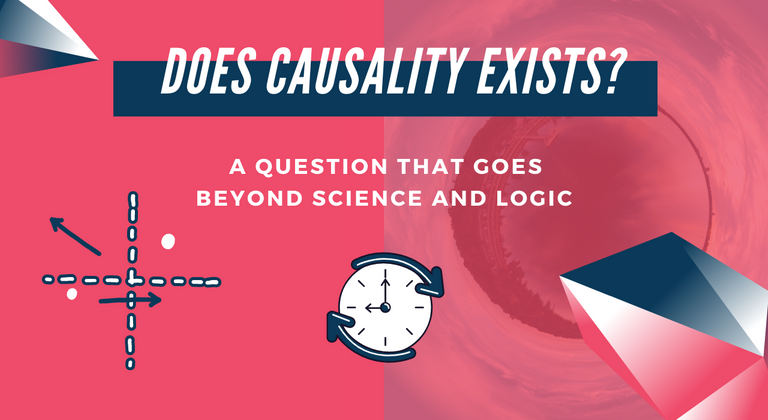
Causality refers to the fundamental principal of cause and effect that can be explained in intricate ways in reference to multiple situations, events and contexts.
At first glance it looks all very simple, an arrow released from a bow will hit some where. You put your hand in fire and it will hurt. Worse, it will burn 🔥. You spit at someone and your face is red and swollen. It all seems that simple, every action is followed by a reaction. Every cause is followed by an effect.
Until we dig a little deeper, and question about the causes that can not be explained.
The ultimate why's?
If you’ll keep on exploring causes behind the causes, you will always reach at a point of the uncaused.
It can be concluded that though cause and effect create a chain that ends with an effect or may be never ends. But ultimately uncaused is behind the every cause to begin with. Hidden beneath the layers of causes and effects.
A school of thought suggests that causality is the fundamental principle of existence, that is, everything else can explained in terms of causality but it can not be explained with anything or in itself.
Causality is there, one can prove it happens, causes do have effects. But no one can prove why?
Another school of thought popularized by A.O Hume suggest that causality is a mental construct, something created by the history of similar perceptions. It is a man made concept.
While though it will be hard to digest but it feels truer in a sense, may be because so much is still unknown to humans.
There can be a hundreds or thousands of reasons that cause something. We just end up exemplifying some particular effects with some particular causes because of our observations of certain regularities of events. Where one always follows the other.
This is to say, the correlation we create between events where one thing must lead to the other might not be actually true. The 'must' is imposed by us. Verified by our history of observation of the patterns.
What would actually make sense is to say that occurrence of an event is one of the probable effect of a particular or multiple causes.
Causality of Certain Events Just Keeps on Shifting Based on Our Level of Understanding.
For instance, no one actually knows the true shape and appearance of atomic particles. No one has ever seen what an atom or a proton looks like and if the electrons really revolve around the nucleus, like we used to plot in our notebooks.
The concept of atomic particles is explained in physics using mathematical models. And similarly many other concepts of physics can only be analyzed and derived using mathematics.
Meaning science in itself is not concrete and comprehensive. And Its theories at times are propounded by tracing the causation of effects i.e analyzing the backward causality of events rather than the solid observations leading from a cause to an effect.
Does Causality Exists?
Well it does and does not.
I don't believe causality exists as a scientific universal principal.
Because it would mean in a way that everything is predetermined, and provided with sufficient knowledge any event can be exactly predicted with precision.
Also it makes the causality to be something that transcends the existence of even time and space, that existed before anything came into existence.
Concepts are devised by humans to make sense of things around them. The time, space, multiverse, causality are all just concepts. Concepts don't have a reality of their own, they mere exist as an analysis of our perception about things around us.
In a nut shell, causality just defines how we perceive reality and not how it actually exists. So it can not be an absolute truth because it is subjective.
Aristotle proposed a concept that earth was the center and the sun including all the other planets revolved around it. Which was popularized and believed for a very long time.
Today we know that it is not true. It was just an individual's observations of happenings of some events in an attempt to make sense of the world around him.
But if you diminish causality to specific scientific events, I'll say yes it does exist in the form of learnings of our experiences, that can predict the occurrences of some events.
However, In the bigger picture, it fails to explain what causes such properties or conditions to exist at first place that makes all these scientific events predictable.





Your content has been voted as a part of Encouragement program. Keep up the good work!
Use Ecency daily to boost your growth on platform!
Support Ecency
Vote for Proposal
Delegate HP and earn more
This is challenging. I love it
Congratulations @shubhwaj! You have completed the following achievement on the Hive blockchain and have been rewarded with new badge(s) :
Your next target is to reach 800 upvotes.
You can view your badges on your board and compare yourself to others in the Ranking
If you no longer want to receive notifications, reply to this comment with the word
STOPCheck out the last post from @hivebuzz: